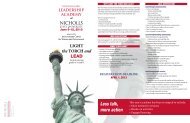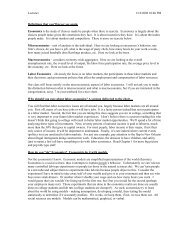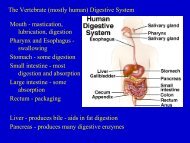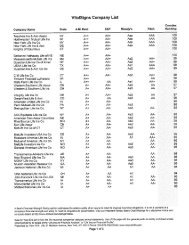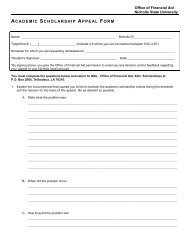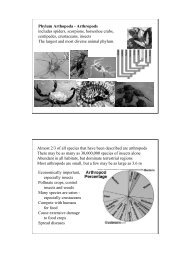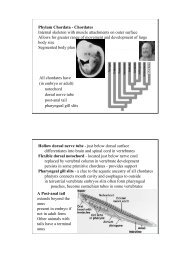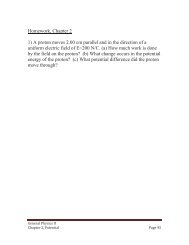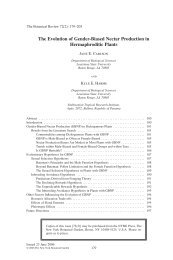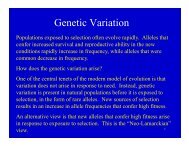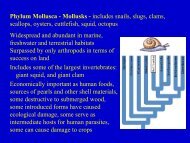Voila 2007 Fall (PDF) - Nicholls State University
Voila 2007 Fall (PDF) - Nicholls State University
Voila 2007 Fall (PDF) - Nicholls State University
Create successful ePaper yourself
Turn your PDF publications into a flip-book with our unique Google optimized e-Paper software.
College of Nursing and Allied Health<br />
Trying on Old Age<br />
New technologies help nurses experience the world as the elderly do.<br />
Jill Mabry, a nursing senior from<br />
Thibodaux, is clad from head to toe in the<br />
trappings of old age. Metal rods lining her<br />
jumpsuit restrict bending and stretching, and<br />
they make walking difficult. Goggles cloud<br />
her vision and gloves make her fingers stiff.<br />
With the help of a walker, she shuffles along.<br />
For a healthy 20-something college<br />
student, imagining the debilitating pain of<br />
arthritis or emphysema or the frustration<br />
of failing eyesight isn’t easy.<br />
But what an 85-year-old patient of<br />
this young nursing graduate has trouble<br />
imagining is that this spry nurse will ever<br />
understand how he feels in his aging body.<br />
The graying nation<br />
The Department of Health and<br />
Human Services estimates that by 2030,<br />
people 65 and older will number 71.5 million<br />
or 20 percent of the population.<br />
That’s a real concern for the nursing<br />
profession, says Rebecca Lyons, head of<br />
the <strong>Nicholls</strong> nursing department. “It’s not<br />
unusual for nurses to walk into a clinic or<br />
a hospital and treat several 80- and 90-<br />
year-old patients. People are living longer,<br />
so elder care is a critical need – not just in<br />
geriatrics departments but across the board<br />
in nursing.”<br />
Empathy, not sympathy<br />
But how do you teach a 20-year-old<br />
what it’s like to be 85 It turns out the key<br />
can be found in familiar adages such as<br />
empathy, not sympathy, and taking a walk<br />
in someone else’s shoes.<br />
“It’s hard to move fast. I keep feeling<br />
like I’m going to fall forward. And these<br />
glasses make me feel like I’m underwater,”<br />
Mabry says.<br />
“If this is really what getting old<br />
feels like, I don’t think I want to do it,”<br />
she says, struggling to push her hair out<br />
of her face even as the suit prevents her<br />
from raising her arm to her head. Trying<br />
to tie her shoelaces leaves her exasperated<br />
and wondering if this stiffness and lack of<br />
coordination is why her grandfather wears<br />
slippers and jumpsuits.<br />
Mabry is trying out new equipment<br />
in the nursing department that enables<br />
students to experience for themselves the<br />
difficulties of aging. They use walkers and<br />
canes, try to read pill bottles and hospital<br />
discharge instructions while wearing<br />
vision-distorting glasses, dress in physical<br />
limitation suits that simulate the joint<br />
stiffness of arthritis and put on empathy<br />
lungs that conjure up the shortness of<br />
breath associated with chronic obstructive<br />
pulmonary disease.<br />
“I’ve always worked with elderly patients,”<br />
Mabry says, “so I’m really excited<br />
about this new program. I hear other<br />
nurses refer to elderly patients as ‘ma-maw’<br />
and ‘pa-paw’ and complain about working<br />
with them. I hope this changes the way<br />
nurses think.” A licensed practical nurse<br />
at St. Anne General Hospital in Raceland,<br />
Mabry is back at school to earn a bachelor’s<br />
degree and become a registered nurse.<br />
‘I love old people’<br />
“When nurses are urging elderly<br />
patients to eat ‘just one more bite’ of their<br />
meal, that patient may be too busy just<br />
fighting for air in their lungs,” says Amanda<br />
Eymard, assistant professor of nursing.<br />
Eymard wrote the grant that made possible<br />
$23,545 of simulation equipment.<br />
It’s important that nursing students<br />
learn patience and understand the ailments<br />
of elderly patients, she says. Students at<br />
all levels of the curriculum, from freshmen<br />
to seniors in their clinicals, will use<br />
this equipment. Eymard is also setting up<br />
demonstrations with local hospitals for<br />
veteran nurses. At one local hospital alone,<br />
45 percent of the patients are 65 years or<br />
older, she says.<br />
“I love old people. I want to pass my<br />
passion along to my students,” she says.<br />
“Many nurses think of older patients as<br />
nagging or complaining, that they won’t<br />
do anything for themselves. But sometimes<br />
they’re experiencing problems we can’t<br />
even imagine. It’s hard to take your medicine<br />
properly if you can’t read the bottle or<br />
even open the cap.<br />
“This should open everyone’s eyes,”<br />
she says, “to the courage so many of our<br />
patients show every day in the face of such<br />
challenges.”<br />
<strong>University</strong> College<br />
The Freshman Connection<br />
Tips on dating, coping with stress and<br />
finding the best cheap food in town<br />
haven’t been the usual fare for university<br />
web sites – until now.<br />
Faculty and staff in <strong>University</strong> College<br />
realize that the key to helping freshmen<br />
adjust to university life goes way beyond<br />
the traditional advice about the right science<br />
classes to take.<br />
Students with personal problems<br />
usually have academic problems, too,<br />
says Carol Blanchard, associate dean and<br />
head of the university studies department.<br />
The success of students in college often<br />
hinges on how they handle homesickness,<br />
financial difficulties and their newfound<br />
independence. It’s all about their transition<br />
from high school to college, she says.<br />
That’s where <strong>Nicholls</strong> Connection<br />
comes in.<br />
Think of it as a university-sponsored<br />
MySpace for freshmen. Students have the<br />
opportunity to meet and visit with their<br />
<strong>Nicholls</strong> peers, while the university gets<br />
to communicate important messages and<br />
learn more about students, their opinions<br />
and problems.<br />
<strong>Nicholls</strong> Connection is basically<br />
an electronic supplement for <strong>University</strong><br />
Studies 101, Blanchard says. “There’s so<br />
much we don’t get a chance to cover with<br />
them, and I know they sometimes hesitate<br />
to come to our office and ask questions.”<br />
The college can also post reminders and<br />
announcements on a message board.<br />
Maintained by New York-based<br />
GoalQuest, the content is updated each<br />
semester and reflects the changing needs of<br />
students as they move through their first<br />
and second semesters at <strong>Nicholls</strong>. Students<br />
might learn how to<br />
live peacefully with<br />
roommates or how<br />
to manage creditcard<br />
debt, post a<br />
bio and chat with<br />
new or old friends,<br />
or they can take a<br />
quick e-survey on<br />
their relationships<br />
with family and<br />
friends. They can<br />
even use interactive<br />
tools like personality<br />
profiles.<br />
All of these<br />
provide useful feedback<br />
for <strong>University</strong><br />
College, Blanchard<br />
says. A struggling<br />
student can be<br />
referred to advisers<br />
for one-on-one help,<br />
and the college’s<br />
services can be tailored as new issues or<br />
needs arise.<br />
“The point is to keep them involved<br />
and dealing with their problems before<br />
they become overwhelming,” Blanchard<br />
says. “Beginning college is a big step, but<br />
they should know they’re not alone.”<br />
30 | Voilà! 31 | Voilà!



